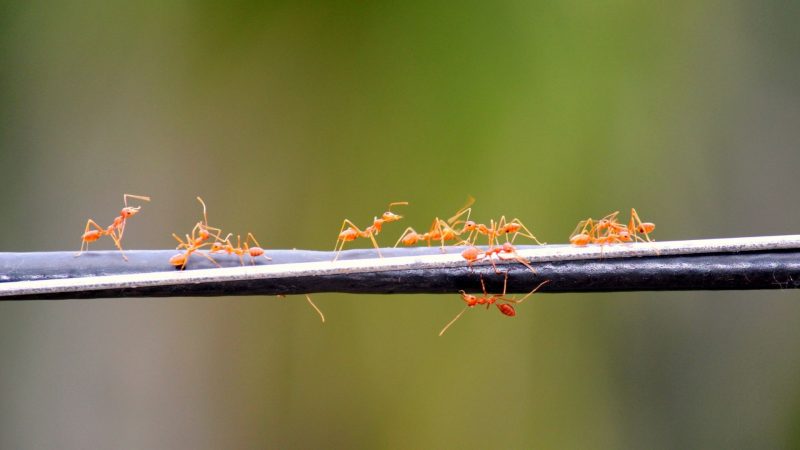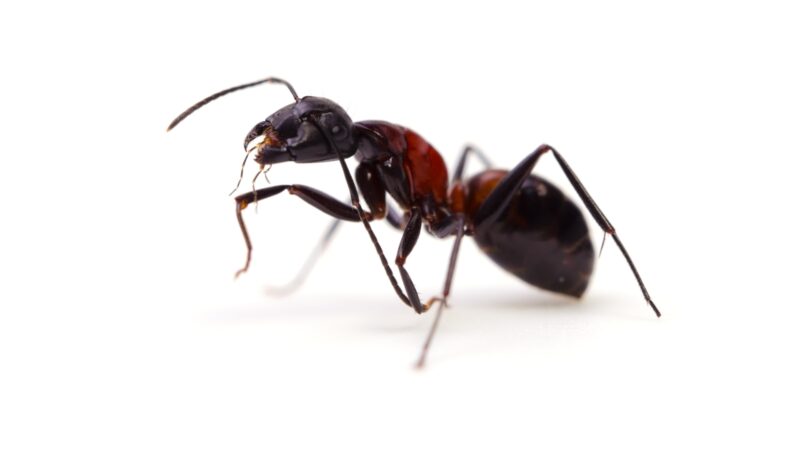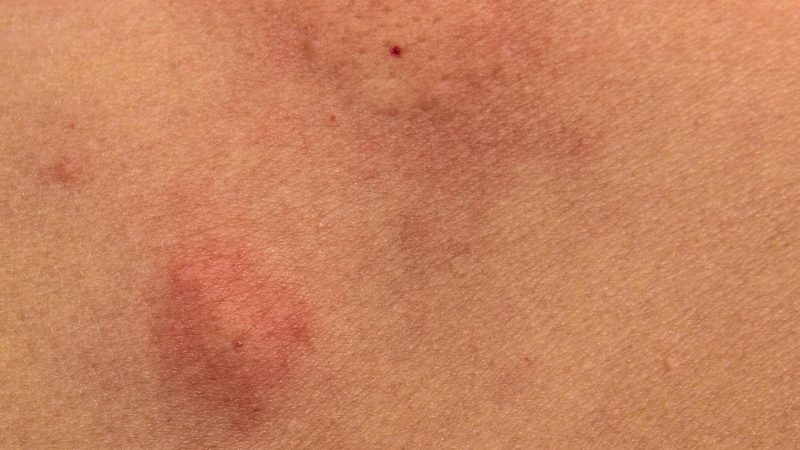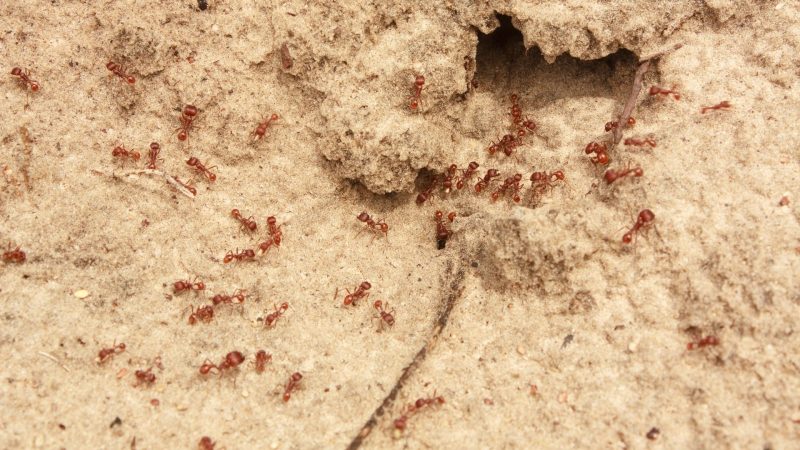Fire ants range in shade from red-brown to black and can reach a length of 1/4 inch. They can create 1-foot-high nests or mounds in grassy places such as lawns. When their colony is disrupted, fire ants become highly aggressive.
What remedies work for ant bites and what don’t? Baking soda and vinegar are the best remedies that can help reduce inflammation in the affected area and be used as a natural ant bite treatment that is safe and effective. However, rubbing alcohol is ineffective and might worsen the pain.
To guide you, we’ve compiled information on how to treat fire ant bites. These remedies can help you get rid of the itch quickly while also being safe, easy, and inexpensive.
What Are Fire Ants?

The color of fire ants is usually red-brown and black, with six legs and a thick exoskeleton to protect them. Fire ants prefer moist environments, such as fresh irrigated lawns. They frequently appear after it has rained. Living insects, dead animals, and honeydew from honeydew-producing insects are all sources of food for them. If disturbed, they will swarm out of their nests and attack in massive numbers, inflicting a terrible sting.
What Does a Fire Ant Bite Look Like?
The fire ant bite is recognized by its burning sensation, redness, and swelling. Fire ant bites create a red mark on the skin where you were bitten.
Are Ant Bites Itchy?

Ant bites are itchy. When they bite they inject a little amount of acidic venom beneath your skin. A fire ant bite usually results in immediate, terrible pain. Itching and skin irritation follow the pain.
Can Ant Bites Make You Sick?
Ant bites might leave a red mark on the bite spot. Even if a fire ant bites you, there is no need to be worried; nevertheless, you should be aware of allergic reactions. The burning feeling goes away after a time, but in rare circumstances, you may get an allergic response on your skin. It is best to see a doctor in such a scenario.
How Long Does a Fire Ant Bite Last?
A fire ant bite causes a rapid burning sensation, followed by itching and red welt on the skin that lasts four to six hours.
Why Is My Ant Bite So Swollen?

It’s usually caused by inflammation or an accumulation of fluid, such as a blister. Swelling can occur when your bones, tissues, or muscles are irritated. It develops as a result of severe itching, which eventually becomes painful as a result of the fire ant bite reaction.
Should You Pop a Fire Ant Bite?
Blisters are frequent with fire ant bites, and you should never pop a blister. A secondary infection might occur if a blister is unintentionally popped. To help avoid infection, keep it clean by washing it with antibacterial soap and cold water and covering the wound.
How Do You Know If You’re Allergic to Ant Bites?
A severe allergic reaction is rare, but it can be fatal. Hives, stomach cramps with nausea or diarrhea, pressure in the chest, difficulty breathing, dizziness, and swelling of the tongue or throat are all symptoms.
Here is a video about fire ant bites and what to do just in case you had an allergic reaction:
Related: How to Get Rid of Fire Ants: A Complete Guide
Signs of Fire Ant Bites
There will be a scorching or stinging feeling for you. Itchy blisters or bumps will appear after about an hour. The lumps normally last for several hours and have a round or semicircular pattern.
When the lumps have been there for several hours, blisters will appear. Most often, they itch a lot. Around a day later, a yellow or white pus-like fluid begins to fill the blisters. In between seven and ten days, they disappear.
Some individuals have a more severe reaction:
- This involves symptoms that are present in the same body part as the bite site but elsewhere. For instance, a single sting to the calf may result in edema of the entire lower leg. Local responses typically persist a few days.
A sting may cause an entire body reaction. Symptoms can include breathing or swallowing difficulties as well as stomach pains, diarrhea, nausea, and vomiting.
Fire Ant Bites Remedies | What Work and What Don’t?

Here are the most effective treatments for fire ant bites:
Ice Cubes
One of the easiest ways to keep the skin from swelling is to apply an ice cube to the fire ant bite. The release of antihistamines causes our skin to expand when a fire ant bites us. As a result, ice prevents histamines from reaching the skin’s surface.
Simply place an ice cube right on the skin area where the fire ant has bitten you. Ice cubes are the most effective antihistamines, as well as pain and itching relievers.
Lemon
Lemon juice contains citric acid that can aid in easing the irritation produced by ant bites. Citric acid also has antimicrobial properties, which can help in preventing infection. Squeeze a small amount of lemon juice into a small bowl and apply to the bites with a cotton ball.
Cucumber
Cucumbers have anti-inflammatory qualities as well as the ability to calm the skin. Cucumber has these two properties, making it ideal for reducing the burning and swelling associated with ant bites. To use cucumber to cure ant bites, just lay a cucumber slice on the bites for treatment.
Salt
Salt is another effective home treatment for reducing pain caused by ant bites. It can treat ant bites by dissolving salt in a few drops of water and applying the solution to the ant bite.
There are many remedies for fire ant bites that work, but this is the only one that does not work:
Rubbing Alcohol
Despite the fact that rubbing alcohol is generally safe for your skin, it should not be used to treat fire ant bites since it may irritate the bites and make them more painful. It’s not meant to be used for a long-time. Redness, dryness, and itching are some of the possible side effects. Instead, wash the bites with antibacterial soap and wipe with cotton and betadine to clean the ant bites to avoid infections.
Does Toothpaste Help Fire Ant Bites?
If fire ants have bitten you, toothpaste can help relieve the burning and itching. Apply a minimal amount of toothpaste on your finger and rub it into the bite area. After 10 minutes, wash it off.
Will Benadryl Help Fire Ant Bites?

Benadryl could be of help to treat itching and swelling. This is available without a prescription and may be purchased over the counter. As required, use 25 mg in 1 or 2 doses every 6 hours. However, it does have side effects, such as drowsiness.
Is Vicks Good for Fire Ant Bites?
Essential oils are found in this product, such as camphor, menthol, eucalyptus oil, cedar leaf oil, nutmeg oil, petrolatum, thymol, and turpentine oil. Its soothing and anti-inflammatory qualities can help relieve the pain, inflammation, and irritation caused by fire ant bites. On your finger, apply a small quantity of Vicks and rub it into the bite spot.
Does Vinegar Help Fire Ant Bites?

Vinegar is a natural treatment for fire ant bites that are safe and effective. It relieves pain, swelling, and itching and quickens the repair of peeling skin caused by scratching. To ease the symptoms of a fire ant bite, soak a cotton ball in vinegar and apply it to the skin.
Does Apple Cider Vinegar Help With Fire Ant Bites?
The acidity of apple cider vinegar has antimicrobial and antibacterial properties that can help to relieve the sting of an ant bite. Gently dilute the apple cider vinegar with a bit of water before applying it to your skin. First, mix it well with water in a 1:1 ratio, then wipe the area of the bites with cotton or spray it.
How to Prevent Fire Ant Bites?

You can try to avoid being bitten by fire ants by doing the following:
- Fire ant nests should be avoided.
- When gardening, use protective gear such as thick socks, boots, and gloves.
- Do not go barefoot in ant-infested areas.
- Keep an eye out for ants in bushes, attics, picnic spots, and trash cans.
- Clear away stones, boards, fallen leaves, logs, and other debris to keep ants from nesting in your yard or garden.
List of Sources
Fire Ants. (2020). National Pesticide Information Center.
Kruse, B., et al. (2021). Fire Ant Bites. National Center for Biotechnology Information.
The National Institute for Occupational Safety and Health (NIOSH): Fire Ants. (2018). Centers for Disease Control and Prevention.
- How to Get Rid of Copperheads | Practical Guide - August 27, 2023
- How to Get Rid of Corn Snakes | What Makes Them Aggressive? - August 27, 2023
- How to Get Rid of Alligators | Safety Measures and Removal Methods - July 16, 2023

